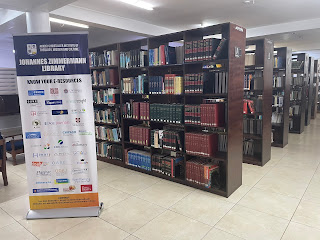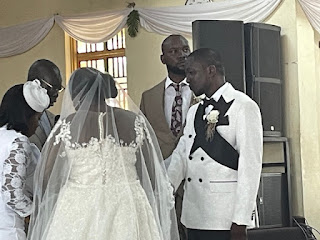During my first day at the Akrofi-Christaller Institute of Theology, Mission and Culture (ACI) in Akropong, Ghana, I sat at a lunch table with Rev. Felix Cornelius Agyei, a PhD student. I asked Pastor Felix about his research topic, a question which launched us into a riveting conversation about the relationship of language and culture with the Gospel of Jesus Christ. Pastor Felix described his research topic as “the study of ‘the works of the law’ and ‘justification’ from the book of Galatians, from the Akan* mother tongue perspective.” Pastor Felix describes how the mother-tongue hermeneutical* approach helps people understand the scriptures from their own context. He says, “It allows the people to hear God speak in their own language.” He acknowledges how many Ghanaian and African peoples see the Bible as the white man’s book and as a European document. Yet, he says that the Bible is a "universal document." He reminds us that the scriptures, much of what we know as the Bible, found their way to Africa before they travelled to Europe, providing the example of the Ethiopian eunuch (see Book of Acts, chapter eight). Pastor Felix shared with me an example of the mother tongue hermeneutical approach, saying
When explaining the concept of sin to people, every theologian wants to use idea of “harmartia,” which means “missing the mark,” a Graeco-Roman concept which the [Graeco-Roman] world of that time would understand…But as an Akan, when I explain “missing the mark,” there is no understanding. But, [culturally speaking], when I want people to desist from a certain thing, I need to describe it as smelly, as foul, as something you don’t want to touch. In Akan we say “e-bone.* When some of these [local] concepts are employed and amalgamated with the hamartia concept...when missing the mark of Christ [is connected with] the thing you are involved with [which] is ‘smelling’…[you question yourself about] how can you go close to God with that smell? These are some of the things that will ring well in the African, and this is what is motivating me to study [in mother tongue language and our local thought categories] …

Rev. Felix Cornelius Agyei
Pastor Felix and his research interest represent the ethos and vision of ACI. Founded by the late African Theologian Kwame Bediako almost thirty years ago, ACI seeks to be a “pacesetting postgraduate university, training Christian workers and leaders for effective mission in the African context.” ACI achieves this vision by developing robust academic programs which provide tools for “serious and creative research into African Christianity,” serving the wider community in Ghana, Africa and beyond, focusing on training for Christian mission according to the African context. Amara Baptizo, a student from Sierra Leone, testifies to the effectiveness of ACI’s vision and mission when he tells me, “Here at ACI, I feel like my ‘African-ness’ is appreciated.”

Photo Credit: from Amazon
This year, from the end of May until the end of June, I was privileged to spend four full weeks at ACI, spending quality time with staff, faculty, and students over lunch, breakfast, and during and after our daily devotions. I was also invited into the homes of a few faculty members, and I am grateful to have had focused discussions with two faculty members regarding my own research interest; their input and feedback challenged me in some very important ways! Having been invited to ACI as a Research Associate, I am grateful to also have had access to their world class library where I logged many hours writing two sections of my doctoral thesis. The staff could not have been more accommodating and delightful.

Newly built and dedicated library with conference hall,
periodicals room, archives, and museum

World class library which centers titles concerning
Christianity in the Global South

Library carrel where I did most of my writing

Justice, who works in the Archives Section of the library,
is passionate and committed to preserving historical documents
of the church and mission in Ghana
During my four weeks, I felt like I was welcomed as part of the ACI family, attending and helping with special events and being invited to preach during their Wednesday morning extended worship the final week I was there.

After devotions on my final day with ACI Registrar
Rev. Dr. Michael Nortey and ACI Chaplain Dr. Ernest Afrifa Anane
I am grateful to Rev. Cheryl Barnes and the Africa Office of Presbyterian World Mission for their support to pursue this unique opportunity to travel to a new place, make new friends, and be inspired by what is possible as we listen together for what God is doing in our unique contexts. From personal experience, I can say that "ACI is a great place," and in the words of our friend Ingrid, "Given its awesome foundations, ACI can be an even greater place, amen." To God be the glory!

During my time at ACI, I was able to attend and assist with three major
events: the annual Kwame Bediako Memorial lecture, the Inaugural Professional Lecture of Professor Laryea, and ACI's annual Interfaith Symposium
.jpg)
Professor Philip Laryea, newly installed Rector of ACI, being
congratulated by a Ghanaian king after his Inaugural Lecture
Photo Credit: ACI
*Akan refers to a family of languages and peoples found in southeastern Ghana.
*The term “hermeneutical” or “hermeneutic” refers to the idea of the means and methods by which we make interpretation and deduce meaning.
*this is an English transliteration of the Twi word “bɔne” and the Twi expression “hua bɔne,” signifying a bad smell. Twi is a language shared by the Akan peoples of Ghana.



.jpg)
















.jpg)
%202.jpg)
%203.jpg)
%204.jpg)

